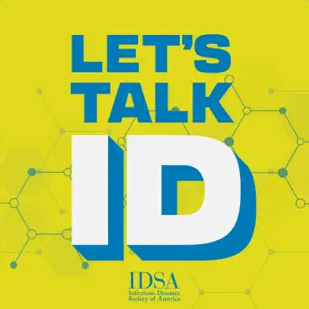What we’re hearing: Reflections on the end of the COVID public health emergency & lessons in communication
Facebook Twitter LinkedIn Email For her first episode as one of the hosts of IDSA’s “Let’s Talk ID” podcast, Mati Hlatshwayo Davis, MD, MPH, director of health for the city of St. Louis, chose a complex but important subject — the end of the COVID-19 federal public health emergency on May 11. She was joined by two guests in a wide-ranging discussion of the short- and long-term impacts of the measure’s end, including regarding equity.
For her first episode as one of the hosts of IDSA’s “Let’s Talk ID” podcast, Mati Hlatshwayo Davis, MD, MPH, director of health for the city of St. Louis, chose a complex but important subject — the end of the COVID-19 federal public health emergency on May 11. She was joined by two guests in a wide-ranging discussion of the short- and long-term impacts of the measure’s end, including regarding equity.
Among other topics, Allison Agwu, MD, ScM, FIDSA, HIVMA chair-elect, reflected on the expanded use of telemedicine during the pandemic and related questions moving forward:
We learned we can actually do telemedicine. We’ve been trying to do telemedicine in an effective way for years and couldn’t do it. All of a sudden, within two months, we had fully active telemedicine clinics and were expanding Medicaid and allowing providers to see patients across different vicinities. These were things that allowed us to literally meet people where they were, which was behind their screens because they couldn’t come in.
I think this is one of those, ‘What are we trying to do here?’ Are we trying to have the people get the coverage they need so they can have the care that they also need to address preventive illnesses to address not just COVID, but everything else? Or what is the end goal here? That’s what the advocacy to me is about. Can we find a kinder, gentler way to maintain coverage for vulnerable people? That’s it. And I think that’s the advocacy piece of it.
Maximo Brito, MD, MPH, FIDSA, an IDSA Board member, shared thoughts on the implications for COVID vaccines and treatments:
We’re starting off with low numbers of coverage for vaccines and medications, like Paxlovid, for example, for the people who get COVID and are at risk of progressing to severe disease. If we’re starting out with low numbers, imagine what happens when some of these measures are pulled back, and all of a sudden, people don’t have access to these interventions for free. And so there is a real possibility that we will decrease, especially in the socioeconomically disadvantaged populations, the rates of vaccine coverage and access to medications against COVID, which are low to begin with. Well, we risk making it worse. So that’s a short-term impact of this measure —we might see decreasing coverage rates of vaccines and medications.
In his inaugural episode as a “Let’s Talk ID” host, Buddy Creech, MD, MPH, FPIDS, sat down with two experienced communicators to discuss how ID practitioners can effectively talk about science and medicine with the public, a skill that was critically important during the pandemic. William Schaffner, MD, FIDSA, shared his origin story as a renowned and often quoted media spokesperson on all things ID:
First of all, the Latin root of doctor is 'docere,' 'to teach.' Doctors are teachers. And we, certainly many of us in academic institutions, are in teaching institutions. Somehow, I got the idea that working with journalists through the media was a way of teaching a larger audience. Now, I have to admit that when I was indeed in high school and in college, I did a little theater. And I’ve always thought that teaching is a highly refined form of theater. You have to engage your audience, keep them interested, communicate with them in such a way that they want to keep hearing more. That was kind of the beginning.
Then I was in the public health service, worked with the CDC. They assigned me to the state health department in Rhode Island, where, as it turns out, I was given one of the jobs of speaking with the media when we had a big flu outbreak. And I began to learn from the journalists, from the local TV stations. And after that, like Popsie, it kind of just grew.
As medical correspondent with NBC News, Erika Edwards often looks to experts like Dr. Schaffner and others to help break through medicine’s language barriers. She shared her approach to her work:
I have dedicated my career to translating science findings and medical jargon into language that everyone can understand. I’m not talking about dumbing it down. That’s not what I’m talking about. I’m talking about translating this into language that I can understand. I don’t have an MD. I don’t have a PhD. I have a journalism degree.
I’m really focused on communicating to my Aunt Marge, my neighbor, my kids. These are the people who are really going to benefit or learn from public health officials such as yourselves when it comes to the best medicine, the best medical advice. So I am really looking for folks who can break those barriers, talk really not just to me, but to everyone. Let’s get rid of the jargon. Let’s get rid of ‘patients responded favorably.’ Let’s talk about people who got better, who felt better, things like that.
Don’t miss the entire episode, including tips on how to prepare for media interviews and addressing misinformation with patients. The full episode and all the “Let’s Talk ID” podcasts are available on Apple Podcasts, Google Podcasts and Spotify.
Editor’s Note: The podcast excerpts above have been lightly edited for clarity.


